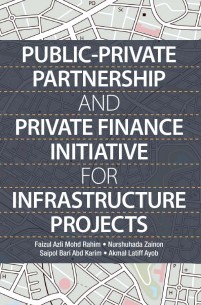Traditionally, public finance has provided most of the major source of funds for investment
in infrastructure projects. However, the challenge of providing infrastructure projects has
led governments worldwide to look at new and innovative alternative methods to finance
and manage infrastructure projects. This has led to the participation of the private sector in
the financing and managing of public services and infrastructure. Among the well-established
private sector participation is the Public-Private Partnership (PPP).
PPP is increasingly being used to bring together the strengths of both sectors to facilitate
the delivery of projects and services. In Malaysia, the government has realized the importance
of PPP in economic development since the implementation of privatisation in 1983.
PPP is a partnership that involves transfer to the private sector the risk and responsibility
to fund and manage a capital investment package and services including the construction,
management, maintenance, improvement and replacement of public sector assets such as
buildings, infrastructure, equipment and other facilities that create a standalone business. They
collaborate on the fundamental of a clearly defined sharing of tasks and risks to achieve benefits
of added value and increased efficiency. PPP provides benefit to both the public and private
sectors, especially when it is done based on trust, openness, fairness and mutual respect.
The terms PPP and PFI (Private Finance Initiative) have often being used inter-changeably
throughout the world although there are subtle differences between them. In Malaysia, PFI
is a public service delivery type of PPP where the responsibility for providing public services
is transferred from the public to the private sector for a considerable period of time. PFI is a
means of using private finance and skills to deliver capital investment projects traditionally
provided by the public sector.
This book contains numerous insights that will enable the readers to understand and
appreciate the theory and practice of PPP/PFI. The contributing authors provide refreshing
ways in addressing the understanding of PPP/PFI particularly in infrastructure projects.
..................................................................................................................................................
Faizul Azli Mohd Rahim is an Associate Professor at the Department of Quantity Surveying, Faculty of
Built Environment, University of Malaya, where he is also currently the Deputy Dean of Research and
Development. His area of interest includes construction economics, project and risk management.
Nurshuhada Zainon is a Senior Lecturer at the Department of Quantity Surveying, Faculty of Built
Environment, University of Malaya. Her area of interest includes IT in construction, construction
economics and project management.
Saipol Bari Abd Karim is a Senior Lecturer at the Department of Quantity Surveying, Faculty of Built
Environment, University of Malaya, specializes in project management and value management.
Akmal Latiff Ayob is a Senior Engineer at Putrajaya Holdings Sdn Bhd, the Master Developer of
Putrajaya, Malaysia.
Write a review
Your Name:Your Review: Note: HTML is not translated!
Rating: Bad Good
Enter the code in the box below:




